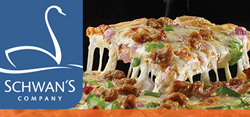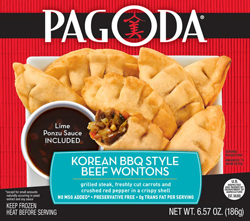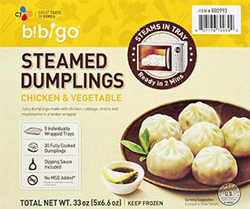Seoul, Korea-headquartered CJ CheilJedang (CJCJ) has entered into a definitive agreement to acquire Schwan’s, a Marshall, Minnesota, USA-headquartered frozen food company, for $1.84 billion. The deal, the biggest acquisition ever in the Korean food and bioengineering giant’s 65-year history, follows purchases of Gahanna, Ohio-based Kahiki Foods and Mainfrost Tiefkühlkost GmbH of Nidderau, Germany, earlier this year.
 Founded in 1952 as a one-man ice cream home delivery business, today Schwan’s Company operates a nationwide frozen food manufacturing infrastructure and sales network, generating approximately $3 billion in annual sales. It has more than 12,000 employees, 17 manufacturing facilities and 10 distribution centers in the United States, producing a wide range of products for retail, foodservice and industrial customers. Among its household name brands are Schwan’s, Red Baron, Freschetta, MaMa Rosa’s, Sabatasso’s and Tony’s pizza. Frozen cakes and pies are marketed under the Mrs. Smith’s and Edwards labels, while its popular Asian appetizer and snacks brand is Pagoda.
Founded in 1952 as a one-man ice cream home delivery business, today Schwan’s Company operates a nationwide frozen food manufacturing infrastructure and sales network, generating approximately $3 billion in annual sales. It has more than 12,000 employees, 17 manufacturing facilities and 10 distribution centers in the United States, producing a wide range of products for retail, foodservice and industrial customers. Among its household name brands are Schwan’s, Red Baron, Freschetta, MaMa Rosa’s, Sabatasso’s and Tony’s pizza. Frozen cakes and pies are marketed under the Mrs. Smith’s and Edwards labels, while its popular Asian appetizer and snacks brand is Pagoda.This transaction will provide CJCJ with a solid platform for Korean food expansion with access to manufacturing and distribution infrastructure across the USA as well as extensive R&D capabilities. The acquisition will further solidify the foundation to fulfill Chairman Jay Hyun Lee’s philosophy and ambition of spreading Korean food culture across the world.
Schwan Family Keeps 20%
CJCJ convened a board of directors meeting on November 15 to pass a resolution to acquire an 80% equity stake in Schwan’s Company in a cash deal. The Schwan family will retain a 20% equity stake in order to provide stability and strategic knowhow for business expansion, and the Home Service business unit of the company will be carved out for the sellers to retain 100% ownership.
CJCJ convened a board of directors meeting on November 15 to pass a resolution to acquire an 80% equity stake in Schwan’s Company in a cash deal. The Schwan family will retain a 20% equity stake in order to provide stability and strategic knowhow for business expansion, and the Home Service business unit of the company will be carved out for the sellers to retain 100% ownership.
 Paul Schwan“This is an exciting time at Schwan’s. Over the past 66 years, our family, with the help of thousands of employees, has proudly built a very unique and successful food business that reaches consumers virtually everywhere they eat,” said Paul Schwan, a Schwan’s board member and son of the company’s founder. “By becoming a part of an innovative, global team such as CJ CheilJedang, we will be positioned to achieve new levels of growth in the spirit of the vision put forth by my father, Marvin Schwan, so many years ago.”
Paul Schwan“This is an exciting time at Schwan’s. Over the past 66 years, our family, with the help of thousands of employees, has proudly built a very unique and successful food business that reaches consumers virtually everywhere they eat,” said Paul Schwan, a Schwan’s board member and son of the company’s founder. “By becoming a part of an innovative, global team such as CJ CheilJedang, we will be positioned to achieve new levels of growth in the spirit of the vision put forth by my father, Marvin Schwan, so many years ago.”He added that the purchase agreement with CJCJ is the result of a strategic process led by the Schwan family, the company’s board of directors and members of the senior management team “to identify the right company to invest in the long-term future of Schwan’s.”
Once the transaction is closed, Schwan’s will be operated as a subsidiary of CJ Foods America Corp., and its operations will continue to be headquartered in Minnesota. Additionally, the current senior management team will remain in place, with Dimitrios Smymios at the helm as chief executive officer.
CJCJ plans to fund the purchase with proceeds from the sale of CJ HealthCare and acquisition financing amounting to KRW 550 billion. The transaction, subject to customary closing conditions and regulatory approval, is expected to close within 60 to 90 days.
With the acquisition, CJCJ’s infrastructure of manufacturing facilities in the world’s largest processed food market will grow from five plants in California, New York, New Jersey and Ohio to 22 factories. It will also gain access to logistics, distribution, and sales networks across the nation.
Previously limited to selling the Bibigo brand mainly through club store channels such as Costco, newly added infrastructure from the transaction will enable CJCJ to rapidly expand its brands in the North American market.
 More Korean Flavor to Savor
More Korean Flavor to SavorThe company’s established ready meal product line focused on dumplings and noodles will be extended with additional categories including pizza and pies. CJCJ is also expected to add Korean flavor to the existing product categories to further develop a variety of new entrees. It will soon be offering a differentiated, wide range of Asian foods, and expects its portfolio to reach consumers in neighboring countries including Canada and Mexico in the longer term.
In a press released issued on November 15, the buyer stated: “The transaction entails more than simple combination of businesses. We expect to realize meaningful synergies by combining both companies’ differentiated capabilities across the entire operational value chain including R&D, manufacturing, marketing and sales. CJCJ will achieve its mission to become the most recognized Asian HMR company by 2025 with superior Korean food culture by integrating Schwan’s brand power and infrastructure with our R&D capabilities.”
CJ CheilJedang CEO Shin Ho Kang remarked: “Through penetration of North America market, the largest market in the global food industry, we will accelerate the ‘Globalization of Korean Food Culture’ as proposed by Chairman Lee.”
 CJCJ first entered the United States market in 2005 through the acquisition of Annie Chun, followed by the purchase of Omni in 2009 and Kahiki this year. It has built a successful business in North America based on frozen Bibigo Dumpling brand. Through preemptive investments in the USA it is producing frozen dumplings, ready meals and noodles. In 2016 an R&D center was established in California with the aim of spreading “K-Food” culture based on differentiated technology.
CJCJ first entered the United States market in 2005 through the acquisition of Annie Chun, followed by the purchase of Omni in 2009 and Kahiki this year. It has built a successful business in North America based on frozen Bibigo Dumpling brand. Through preemptive investments in the USA it is producing frozen dumplings, ready meals and noodles. In 2016 an R&D center was established in California with the aim of spreading “K-Food” culture based on differentiated technology.




